Department+of+Biological+Science
-
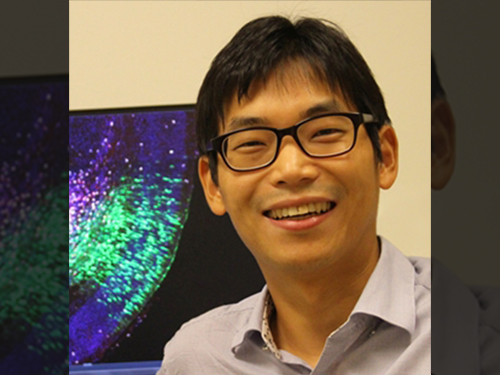 Professor Ki-Jun Yoon selected as the 2019 SUHF Young Investigator
< Professor Ki-Jun Yoon >
Professor Ki-Jun Yoon from the Department of Biological Sciences was named one of four recipients of the 2019 Suh Kyung-Bae Science Foundation (SUHF) Young Investigator Awards.
The SUHF is a non-profit organization established in 2016 and funded by a personal donation of 300 billion KRW in shares from Chairman and CEO Kyung-Bae Suh of the Amorepacific Group. The primary purpose of the foundation is to serve as a platform to nurture and provide comprehensive long-term support for creative and passionate young Korean scientists committed to pursuing research in the field of life sciences. The SUHF selects three to five scientists through an open recruiting process every year, and grants each scientist a maximum of 2.5 billion KRW over a period of up to five years.
Since January this year, the foundation received 83 research proposals from scientists across the nation, especially from those who had less than five years of experience as professors, and selected the four recipients, including Professor Yoon.
Professor Yoon was recognized for his contributions to the advancement of research on how post-transcriptional mechanisms may modulate stem cell properties. His research project involves deciphering the molecular mechanisms controlling RNA metabolism in neural stem cells during normal development, and how alterations in RNA regulatory programs lead to human brain disorders.
< (From left) Professor Joo-Hong Park, Professor Yuree Lee, Chairman and CEO Kyung-Bae Suh, Professor Eunjung Lee, Professor Ki-Jun Yoon, ⓒ Amorepacific Group >
The other awards were given to Professor Joo-Hong Park and Professor Yuree Lee of Seoul National University, and Professor Eunjung Lee of Boston Children's Hospital and Harvard Medical School.
The awards ceremony was held on September 18 at the Amorepacific Headquarters in Seoul.
With these four new awardees, a total of 14 scientists have been named as SUHF Young Investigators to date.
(END)
2019.09.23 View 10937
Professor Ki-Jun Yoon selected as the 2019 SUHF Young Investigator
< Professor Ki-Jun Yoon >
Professor Ki-Jun Yoon from the Department of Biological Sciences was named one of four recipients of the 2019 Suh Kyung-Bae Science Foundation (SUHF) Young Investigator Awards.
The SUHF is a non-profit organization established in 2016 and funded by a personal donation of 300 billion KRW in shares from Chairman and CEO Kyung-Bae Suh of the Amorepacific Group. The primary purpose of the foundation is to serve as a platform to nurture and provide comprehensive long-term support for creative and passionate young Korean scientists committed to pursuing research in the field of life sciences. The SUHF selects three to five scientists through an open recruiting process every year, and grants each scientist a maximum of 2.5 billion KRW over a period of up to five years.
Since January this year, the foundation received 83 research proposals from scientists across the nation, especially from those who had less than five years of experience as professors, and selected the four recipients, including Professor Yoon.
Professor Yoon was recognized for his contributions to the advancement of research on how post-transcriptional mechanisms may modulate stem cell properties. His research project involves deciphering the molecular mechanisms controlling RNA metabolism in neural stem cells during normal development, and how alterations in RNA regulatory programs lead to human brain disorders.
< (From left) Professor Joo-Hong Park, Professor Yuree Lee, Chairman and CEO Kyung-Bae Suh, Professor Eunjung Lee, Professor Ki-Jun Yoon, ⓒ Amorepacific Group >
The other awards were given to Professor Joo-Hong Park and Professor Yuree Lee of Seoul National University, and Professor Eunjung Lee of Boston Children's Hospital and Harvard Medical School.
The awards ceremony was held on September 18 at the Amorepacific Headquarters in Seoul.
With these four new awardees, a total of 14 scientists have been named as SUHF Young Investigators to date.
(END)
2019.09.23 View 10937 -
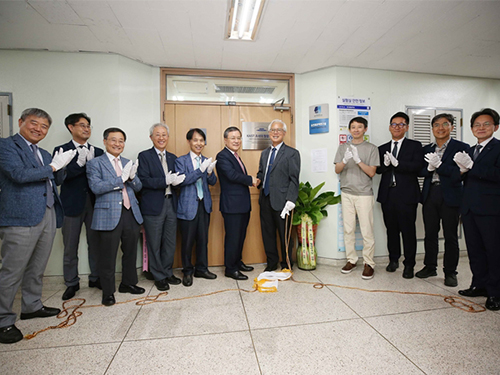 Two More Cross-generation Collaborative Labs Open
< President Sung-Chul Shin (sixth from the left) and Professor Sun Chang Kim (seventh from the left) at the signboard ceremony of KAIST BioDesigneering Laboratory >
KAIST opened two more cross-generation collaborative labs last month. KAIST BioDesigneering Laboratory headed by Professor Sun Chang Kim from the Department of Biological Sciences and Nanophotonics Laboratory led by Professor Yong-Hee Lee from the Department of Physics have been selected to receive 500 million KRW funding for five years.
A four-member selection committee including the former President of ETH Zürich Professor Emeritus Ralph Eichler and Professor Kwang-Soo Kim of Harvard Medical School conducted a three-month review and evaluation for this selection to be made. With these two new labs onboard, a total of six cross-generation collaborative labs will be operated on campus.
The operation of cross-generation collaborative labs has been in trial since March last year, as one of the KAIST’s Vision 2031 research innovation initiatives. This novel approach is to pair up senior and junior faculty members for sustaining research and academic achievements even after the senior researcher retires, so that the spectrum of knowledge and research competitiveness can be extended to future generations. The selected labs will be funded for five years, and the funding will be extended if necessary. KAIST will continue to select new labs every year.
One of this year’s selectees Professor Sun Chang Kim will be teamed up with Professor Byung-Kwan Cho from the same department and Professor Jung Kyoon Choi from the Department of Bio and Brain Engineering to collaborate in the fields of synthetic biology, systems biology, and genetic engineering. This group mainly aims at designing and synthesizing optimal genomes that can efficiently manufacture protein drug and biomedical active materials. They will also strive to secure large amounts of high-functioning natural active substances, new adhesive antibacterial peptides, and eco-friendly ecological restoration materials. It is expected that collaboration between these three multigenerational professors will help innovate their bio-convergence technology and further strengthen their international competitiveness in the global bio-market.
Another world-renowned scholar Professor Yong-Hee Lee of photonic crystal laser study will be joined by Professor Minkyo Seo from the same department and Professor Hansuek Lee from the Graduate School of Nanoscience and Technology. They will explore the extreme limits of light-material interaction based on optical micro/nano resonators, with the goal of developing future nonlinear optoelectronic and quantum optical devices. The knowledge and technology newly gained from the research are expected to provide an important platform for a diverse range of fields from quantum communications to biophysics.
(END)
2019.09.06 View 12810
Two More Cross-generation Collaborative Labs Open
< President Sung-Chul Shin (sixth from the left) and Professor Sun Chang Kim (seventh from the left) at the signboard ceremony of KAIST BioDesigneering Laboratory >
KAIST opened two more cross-generation collaborative labs last month. KAIST BioDesigneering Laboratory headed by Professor Sun Chang Kim from the Department of Biological Sciences and Nanophotonics Laboratory led by Professor Yong-Hee Lee from the Department of Physics have been selected to receive 500 million KRW funding for five years.
A four-member selection committee including the former President of ETH Zürich Professor Emeritus Ralph Eichler and Professor Kwang-Soo Kim of Harvard Medical School conducted a three-month review and evaluation for this selection to be made. With these two new labs onboard, a total of six cross-generation collaborative labs will be operated on campus.
The operation of cross-generation collaborative labs has been in trial since March last year, as one of the KAIST’s Vision 2031 research innovation initiatives. This novel approach is to pair up senior and junior faculty members for sustaining research and academic achievements even after the senior researcher retires, so that the spectrum of knowledge and research competitiveness can be extended to future generations. The selected labs will be funded for five years, and the funding will be extended if necessary. KAIST will continue to select new labs every year.
One of this year’s selectees Professor Sun Chang Kim will be teamed up with Professor Byung-Kwan Cho from the same department and Professor Jung Kyoon Choi from the Department of Bio and Brain Engineering to collaborate in the fields of synthetic biology, systems biology, and genetic engineering. This group mainly aims at designing and synthesizing optimal genomes that can efficiently manufacture protein drug and biomedical active materials. They will also strive to secure large amounts of high-functioning natural active substances, new adhesive antibacterial peptides, and eco-friendly ecological restoration materials. It is expected that collaboration between these three multigenerational professors will help innovate their bio-convergence technology and further strengthen their international competitiveness in the global bio-market.
Another world-renowned scholar Professor Yong-Hee Lee of photonic crystal laser study will be joined by Professor Minkyo Seo from the same department and Professor Hansuek Lee from the Graduate School of Nanoscience and Technology. They will explore the extreme limits of light-material interaction based on optical micro/nano resonators, with the goal of developing future nonlinear optoelectronic and quantum optical devices. The knowledge and technology newly gained from the research are expected to provide an important platform for a diverse range of fields from quantum communications to biophysics.
(END)
2019.09.06 View 12810 -
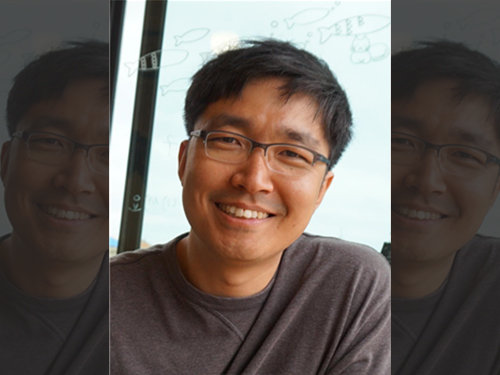 Professor Sang Gyu Kim Receives Yeochon Award for Ecology
Professor Sang-Gyu Kim from the Department of Biological Sciences was selected as the winner of the 12th Yeochon Award for Ecology presented by the Yeochon Association for Ecological Research.
The award was conferred on August 13 in Jeju at the annual conference co-hosted by the Ecological Society of Korea and the Yeochon Association for Ecological Research. Professor Kim received 10 million KRW in prize money.
Professor Kim was recognized for his achievements and contributions in studying herbivorous insects ‘rice weevils’ and their host plant ‘wild tobacco’, especially for having explored the known facts in traditional ecology at the molecular level. His findings are presented in his paper titled ‘Trichobaris weevils distinguish amongst toxic host plants by sensing volatiles that do not affect larval performance’ published in Molecular Ecology in July 2016.
Furthermore, Professor Kim’s research team is continuing their work to identify the ecological functions of plant metabolites as well as interactions between flowers and insect vectors at the molecular level. In doing so, the team edits genes in various plant species using the latest gene editing technology.
The Yeochon Award for Ecology was first established in 2005 with funds donated by a senior ecologist, the late Honorary Professor Joon-Ho Kim of Seoul National University. The award is named after the professor’s pen name “Yeochon” and is intended to encourage promising next-generation ecologists to produce outstanding research achievements in the field of basic ecology.
Professor Kim said, “I will take this award as encouragement to continue taking challenging risks to observe ecological phenomenon from a new perspective. I will continue my research with my students with joy and enthusiasm.”
2019.08.14 View 8361
Professor Sang Gyu Kim Receives Yeochon Award for Ecology
Professor Sang-Gyu Kim from the Department of Biological Sciences was selected as the winner of the 12th Yeochon Award for Ecology presented by the Yeochon Association for Ecological Research.
The award was conferred on August 13 in Jeju at the annual conference co-hosted by the Ecological Society of Korea and the Yeochon Association for Ecological Research. Professor Kim received 10 million KRW in prize money.
Professor Kim was recognized for his achievements and contributions in studying herbivorous insects ‘rice weevils’ and their host plant ‘wild tobacco’, especially for having explored the known facts in traditional ecology at the molecular level. His findings are presented in his paper titled ‘Trichobaris weevils distinguish amongst toxic host plants by sensing volatiles that do not affect larval performance’ published in Molecular Ecology in July 2016.
Furthermore, Professor Kim’s research team is continuing their work to identify the ecological functions of plant metabolites as well as interactions between flowers and insect vectors at the molecular level. In doing so, the team edits genes in various plant species using the latest gene editing technology.
The Yeochon Award for Ecology was first established in 2005 with funds donated by a senior ecologist, the late Honorary Professor Joon-Ho Kim of Seoul National University. The award is named after the professor’s pen name “Yeochon” and is intended to encourage promising next-generation ecologists to produce outstanding research achievements in the field of basic ecology.
Professor Kim said, “I will take this award as encouragement to continue taking challenging risks to observe ecological phenomenon from a new perspective. I will continue my research with my students with joy and enthusiasm.”
2019.08.14 View 8361 -
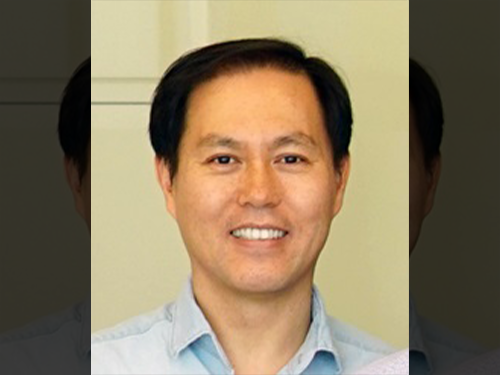 Professor Jin Woo Kim Wins the 14th Macrogen Scientist Award
Professor Jin Woo Kim of the Department of Biological Sciences at KAIST received the 14th Macrogen Scientist Award at the 2017 KSMCB International Conference held in COEX on September 12, 2017.
The award is given by the Korean Society for Molecular and Cellular Biology (KSMCB) and sponsored by Macrogen, a service provider of genome research. The award was established in 2004 to recognize biological scientists who have accomplished excellent performance in the field of basic life sciences.
Professor Kim has achieved outstanding research performances on nerve development, such as identifying the cause of senile retinal degenerative disease and finding retinal nerve cells that distinguish light and darkness in dark conditions.
Recently, he discovered intercellular communication, which controls the development of retinal neurons. His findings have contributed to addressing the principles of maintenance and regeneration of retinal neurons.
Since joining KAIST, he has presented approximately 20 papers and published in numerous international journals including Cell Reports, Genes and Development, and EMBO Journal. Moreover, he delivered special lectures at international conferences, universities, and institutes around the world.
2017.09.14 View 11247
Professor Jin Woo Kim Wins the 14th Macrogen Scientist Award
Professor Jin Woo Kim of the Department of Biological Sciences at KAIST received the 14th Macrogen Scientist Award at the 2017 KSMCB International Conference held in COEX on September 12, 2017.
The award is given by the Korean Society for Molecular and Cellular Biology (KSMCB) and sponsored by Macrogen, a service provider of genome research. The award was established in 2004 to recognize biological scientists who have accomplished excellent performance in the field of basic life sciences.
Professor Kim has achieved outstanding research performances on nerve development, such as identifying the cause of senile retinal degenerative disease and finding retinal nerve cells that distinguish light and darkness in dark conditions.
Recently, he discovered intercellular communication, which controls the development of retinal neurons. His findings have contributed to addressing the principles of maintenance and regeneration of retinal neurons.
Since joining KAIST, he has presented approximately 20 papers and published in numerous international journals including Cell Reports, Genes and Development, and EMBO Journal. Moreover, he delivered special lectures at international conferences, universities, and institutes around the world.
2017.09.14 View 11247 -
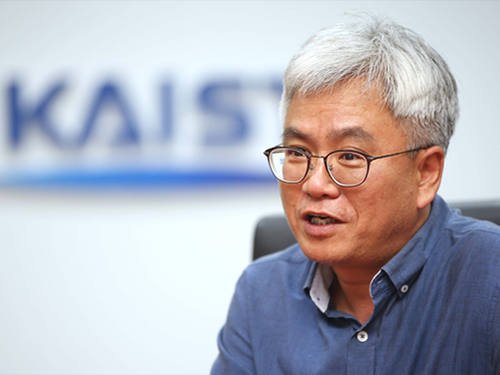 Professor Dae-Sik Im to Head the Science, Technology and Innovation Office at the Ministry of Science & ICT
(Professor Dae-Sik Im of the Department of Biological Sciences)
Professor Dae-Sik Im of the Department of Biological Sciences, a renowned molecular cell biologist, was named to head the Science, Technology and Innovation Office in the Ministry of Science and ICT on August 31. He will be responsible for the oversight of national R&D projects as well as budget deliberation. Joining the KAIST faculty in 2002, he led the Creative Research Center of Cell Division and Differentiation at KAIST.
Announcing the nomination of Professor Im, Cheong Wa Dae spokesman Park Soo-Hyun said, “Professor Im will be the best person to lead the innovation of the research infrastructure system for basic research studies. We believe that his expertise and leadership will make a significant impact in enhancing the nation’s science and technology competitiveness. This vice minister position in the Ministry of Science and ICT was newly created in an effort to enhance national science and technology initiatives by President Moon Jae-In.
Professor Im said at the news conference, “I would like to make a sustainable, as well as credible, system ensuring the ingenuity of scientists in Korean labs. To this end, I will make every effort to enhance Korea’s innovative research environment in a way to maximize research achievements.”
2017.09.03 View 11079
Professor Dae-Sik Im to Head the Science, Technology and Innovation Office at the Ministry of Science & ICT
(Professor Dae-Sik Im of the Department of Biological Sciences)
Professor Dae-Sik Im of the Department of Biological Sciences, a renowned molecular cell biologist, was named to head the Science, Technology and Innovation Office in the Ministry of Science and ICT on August 31. He will be responsible for the oversight of national R&D projects as well as budget deliberation. Joining the KAIST faculty in 2002, he led the Creative Research Center of Cell Division and Differentiation at KAIST.
Announcing the nomination of Professor Im, Cheong Wa Dae spokesman Park Soo-Hyun said, “Professor Im will be the best person to lead the innovation of the research infrastructure system for basic research studies. We believe that his expertise and leadership will make a significant impact in enhancing the nation’s science and technology competitiveness. This vice minister position in the Ministry of Science and ICT was newly created in an effort to enhance national science and technology initiatives by President Moon Jae-In.
Professor Im said at the news conference, “I would like to make a sustainable, as well as credible, system ensuring the ingenuity of scientists in Korean labs. To this end, I will make every effort to enhance Korea’s innovative research environment in a way to maximize research achievements.”
2017.09.03 View 11079 -
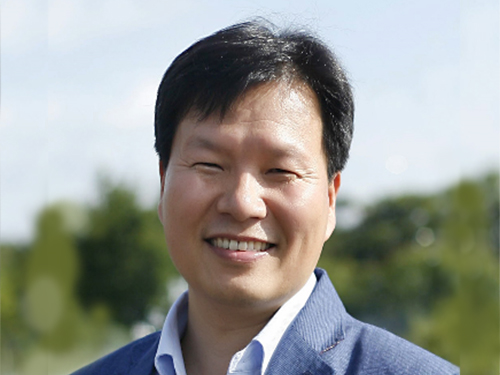 Professor Won Do Heo Receives 'Scientist of the Month Award'
Professor Won Do Heo of the Department of Biological Sciences was selected as the “Scientist of the Month” for April 2017 by the Ministry of Science, ICT and Future Planning and the National Research Foundation of Korea.
Professor Heo was recognized for his suggestion of a new biological research method developing various optogenetics technology which controls cell function by using light. He developed the technology using lasers or LED light, without the need for surgery or drug administration, to identify the cause of diseases related to calcium ions such as Alzheimer’s disease and cancer.
The general technique used in optogenetics, that control cells in the body with light, is the simple activation and deactivation of neurons.
Professor Heo developed a calcium ion channel activation technique (OptoSTIM1) to activate calcium ions in the body using light. He also succeeded in increasing calcium concentrations with light to enhance the memory capacity of mice two-fold.
Using this technology, the desired amount and residing time of calcium ion influx can be controlled by changing light intensity and exposure periods, enabling the function of a single cell or various cells in animal tissue to be controlled remotely.
The experimental results showed that calcium ion influx can be activated in cells that are affected by calcium ions, such as normal cells, cancer cells, and human embryonic stem cells. By controlling calcium concentrations with light, it is possible to control biological phenomena, such as cellular growth, neurotransmitter transmission, muscle contraction, and hormone control.
Professor Heo said, “Until now, it was standard to use optogenetics to activate neurons using channelrhodopsin. The development of this new optogenetic technique using calcium ion channel activation can be applied to various biological studies, as well as become an essential research technique in neurobiology.
The “Scientist of the Month Award” is given every month to one researcher who made significant contributions to the advancement of science and technology with their outstanding research achievement. The awardee will receive prize money of ten million won.
2017.04.07 View 10452
Professor Won Do Heo Receives 'Scientist of the Month Award'
Professor Won Do Heo of the Department of Biological Sciences was selected as the “Scientist of the Month” for April 2017 by the Ministry of Science, ICT and Future Planning and the National Research Foundation of Korea.
Professor Heo was recognized for his suggestion of a new biological research method developing various optogenetics technology which controls cell function by using light. He developed the technology using lasers or LED light, without the need for surgery or drug administration, to identify the cause of diseases related to calcium ions such as Alzheimer’s disease and cancer.
The general technique used in optogenetics, that control cells in the body with light, is the simple activation and deactivation of neurons.
Professor Heo developed a calcium ion channel activation technique (OptoSTIM1) to activate calcium ions in the body using light. He also succeeded in increasing calcium concentrations with light to enhance the memory capacity of mice two-fold.
Using this technology, the desired amount and residing time of calcium ion influx can be controlled by changing light intensity and exposure periods, enabling the function of a single cell or various cells in animal tissue to be controlled remotely.
The experimental results showed that calcium ion influx can be activated in cells that are affected by calcium ions, such as normal cells, cancer cells, and human embryonic stem cells. By controlling calcium concentrations with light, it is possible to control biological phenomena, such as cellular growth, neurotransmitter transmission, muscle contraction, and hormone control.
Professor Heo said, “Until now, it was standard to use optogenetics to activate neurons using channelrhodopsin. The development of this new optogenetic technique using calcium ion channel activation can be applied to various biological studies, as well as become an essential research technique in neurobiology.
The “Scientist of the Month Award” is given every month to one researcher who made significant contributions to the advancement of science and technology with their outstanding research achievement. The awardee will receive prize money of ten million won.
2017.04.07 View 10452 -
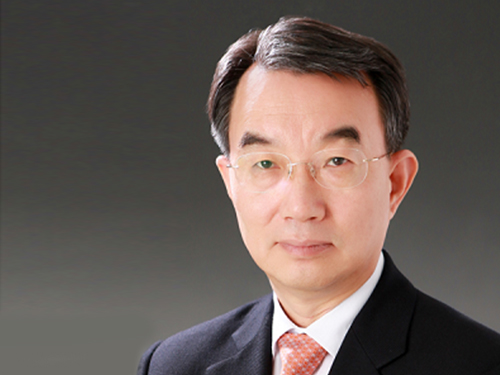 Professor Joonho Choe Appointed as the President of the KSMCB
Professor Joonho Choe of the Biological Sciences Department at KAIST has been elected the 25th president of Korean Society for Molecular and Cellular Biology (KSMCB).
His presidency will last one year, beginning on January 1, 2016.
Established in 1989, the Society has served as the largest academic gathering in the field of life sciences, holding an international conference every fall. It has more than 12,400 fellows.
Professor Choe served as the vice president of KSMC as well as the editor of its journal, Molecules and Cells.
He said, “The 2016 International Conference of the KSMCB will take place on October 12-14, 2016 at the COEX Convention and Exhibition Hall in Seoul. This year, we are preparing 20 symposiums and will invite four international renowned keynote speakers in the field including a Nobel Laureate. We hope many people, students and young researchers in particular, from academia and industry will join the conference.”
Professor Choe received his doctoral degree from the University of California, Los Angeles (UCLA) after graduating from Seoul National University with his bachelor and master’s degrees.
2016.01.05 View 10564
Professor Joonho Choe Appointed as the President of the KSMCB
Professor Joonho Choe of the Biological Sciences Department at KAIST has been elected the 25th president of Korean Society for Molecular and Cellular Biology (KSMCB).
His presidency will last one year, beginning on January 1, 2016.
Established in 1989, the Society has served as the largest academic gathering in the field of life sciences, holding an international conference every fall. It has more than 12,400 fellows.
Professor Choe served as the vice president of KSMC as well as the editor of its journal, Molecules and Cells.
He said, “The 2016 International Conference of the KSMCB will take place on October 12-14, 2016 at the COEX Convention and Exhibition Hall in Seoul. This year, we are preparing 20 symposiums and will invite four international renowned keynote speakers in the field including a Nobel Laureate. We hope many people, students and young researchers in particular, from academia and industry will join the conference.”
Professor Choe received his doctoral degree from the University of California, Los Angeles (UCLA) after graduating from Seoul National University with his bachelor and master’s degrees.
2016.01.05 View 10564 -
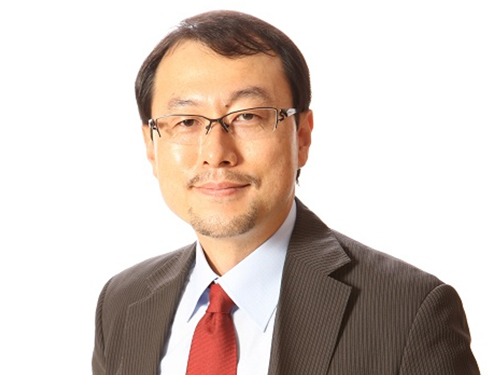 Professor Sangyong Jon Appointed Fellow of AIMBE
Professor Sangyong Jon of the Department of Biological Sciences at KAIST has been appointed a member of the American Institute for Medical and Biological Engineering (AIMBE) fellowship.
Established in 1991, AIMBE is a non-profit organization based in Washington, D.C., representing 50,000 individuals and the top 2% of medical and biological engineers. AIMBE provides policy advice and advocacy for medical and biological engineering for the benefit of humanity. It has had about 1,500 fellows over the past 25 years. Among the members, only 110 are non-American nationalities.
Following the appointment of Dr. Hae-Bang Lee, the former senior researcher at the Korean Research Institute of Chemical Technology, and Distinguished Professor Sang Yup Lee of the Department of Chemical and Biomolecular Engineering at KAIST, Professor Jon is the third Korean to become an AIMBE fellow. He had an induction ceremony for the appointment of his fellowship at the AIMBE’s Annual Event held on March 15-17, 2015 in Washington, D.C.
An authority on nanomedicine, Professor Jon has developed many original technologies including multi-functional Theranostics nano particles for the diagnosis and treatment of diseases. He received the Most Cited Paper Award from Theranostics, an academic journal specialized in nanomedicine, last February.
Additionally, Professor Jon is a leading researcher in the field of translational medicine, using a multi-disciplinary, highly collaborative, “Bench to Bedside” approach for disease treatment and prevention. He created a biotechnology venture company and transferred research developments to the industry in Korea.
2015.03.12 View 14831
Professor Sangyong Jon Appointed Fellow of AIMBE
Professor Sangyong Jon of the Department of Biological Sciences at KAIST has been appointed a member of the American Institute for Medical and Biological Engineering (AIMBE) fellowship.
Established in 1991, AIMBE is a non-profit organization based in Washington, D.C., representing 50,000 individuals and the top 2% of medical and biological engineers. AIMBE provides policy advice and advocacy for medical and biological engineering for the benefit of humanity. It has had about 1,500 fellows over the past 25 years. Among the members, only 110 are non-American nationalities.
Following the appointment of Dr. Hae-Bang Lee, the former senior researcher at the Korean Research Institute of Chemical Technology, and Distinguished Professor Sang Yup Lee of the Department of Chemical and Biomolecular Engineering at KAIST, Professor Jon is the third Korean to become an AIMBE fellow. He had an induction ceremony for the appointment of his fellowship at the AIMBE’s Annual Event held on March 15-17, 2015 in Washington, D.C.
An authority on nanomedicine, Professor Jon has developed many original technologies including multi-functional Theranostics nano particles for the diagnosis and treatment of diseases. He received the Most Cited Paper Award from Theranostics, an academic journal specialized in nanomedicine, last February.
Additionally, Professor Jon is a leading researcher in the field of translational medicine, using a multi-disciplinary, highly collaborative, “Bench to Bedside” approach for disease treatment and prevention. He created a biotechnology venture company and transferred research developments to the industry in Korea.
2015.03.12 View 14831 -
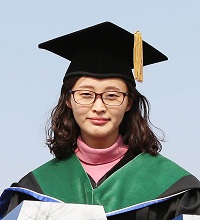 The Number of KAIST Doctoral Graduates to Reach Over Ten Thousands
The ten-thousandth doctoral graduate received her degree in the commencement ceremony on February 13, 2015.
KAIST has contributed to the development of science, technology, and industry in Korea by fostering talents in advanced science and engineering.
Since its establishment forty-four years ago, more than ten-thousand KAIST alumni have received their doctorates. This year’s graduation ceremony took place on February 13, 2015, at the Sports Complex on campus, awarding the ten-thousandth doctoral degree.
Dr. Sun-Mi Cho of the Department of Biological Sciences received the ten-thousandth doctoral degree. A graduate of Jeon-Nam Science High School, Dr. Cho also received her Bachelor of Science degree from KAIST.
Dr. Cho wrote a dissertation entitled “GABA from reactive astrocytes impairs learning and memory in Alzheimer disease.” Her dissertation adviser was Professor Daesoo Kim of the Department of Biological Sciences.
Dr. Cho, who will be a post-doctorate researcher at the Biological Sciences Department, said, “It was my childhood dream to receive a doctorate from KAIST. I cannot believe that I’m the ten-thousandth doctoral graduate, for which I’m very grateful.” She continued, “I hope to become a neuroscientist where I can be of help to the sick.”
In 1978, KAIST only had two doctoral graduates, but since 1987 there have been more than one hundred graduates each year, two hundred since 1994, and four hundred since 2000. In 2015, 522 doctoral students graduated.
One of the first doctoral graduates, Dong-Yol Yang (class of 1978 in the Mechanical Engineering Department), became a professor at the same department of KAIST. Professor Yang expressed his thoughts on the news, “There was a trend in Korea to go overseas for Ph.D. degrees in the early 1970s, but it changed when KAIST began to select candidates for Master’s degrees in 1973 and Doctoral degrees in 1975. Talented Korean students came to KAIST laboratories, and its graduates were known for their knowledge and skills. Now, we see that the talent is coming from overseas.”
At the 2015 Commencement, KAIST conferred 522 Doctoral, 1,241 Master’s, and 915 Bachelor of Science (B.S.) degrees.
Since its inception in 1971, KAIST has granted 10,403 doctor's, 26,402 master's, and 51,412 bachelor's degrees.
In the picture below, Professor Dong-Yol Yang (left) seats next to Dr. Sun-Mi Cho (right), the recipient of 10,000th doctoral degree.
2015.02.16 View 11130
The Number of KAIST Doctoral Graduates to Reach Over Ten Thousands
The ten-thousandth doctoral graduate received her degree in the commencement ceremony on February 13, 2015.
KAIST has contributed to the development of science, technology, and industry in Korea by fostering talents in advanced science and engineering.
Since its establishment forty-four years ago, more than ten-thousand KAIST alumni have received their doctorates. This year’s graduation ceremony took place on February 13, 2015, at the Sports Complex on campus, awarding the ten-thousandth doctoral degree.
Dr. Sun-Mi Cho of the Department of Biological Sciences received the ten-thousandth doctoral degree. A graduate of Jeon-Nam Science High School, Dr. Cho also received her Bachelor of Science degree from KAIST.
Dr. Cho wrote a dissertation entitled “GABA from reactive astrocytes impairs learning and memory in Alzheimer disease.” Her dissertation adviser was Professor Daesoo Kim of the Department of Biological Sciences.
Dr. Cho, who will be a post-doctorate researcher at the Biological Sciences Department, said, “It was my childhood dream to receive a doctorate from KAIST. I cannot believe that I’m the ten-thousandth doctoral graduate, for which I’m very grateful.” She continued, “I hope to become a neuroscientist where I can be of help to the sick.”
In 1978, KAIST only had two doctoral graduates, but since 1987 there have been more than one hundred graduates each year, two hundred since 1994, and four hundred since 2000. In 2015, 522 doctoral students graduated.
One of the first doctoral graduates, Dong-Yol Yang (class of 1978 in the Mechanical Engineering Department), became a professor at the same department of KAIST. Professor Yang expressed his thoughts on the news, “There was a trend in Korea to go overseas for Ph.D. degrees in the early 1970s, but it changed when KAIST began to select candidates for Master’s degrees in 1973 and Doctoral degrees in 1975. Talented Korean students came to KAIST laboratories, and its graduates were known for their knowledge and skills. Now, we see that the talent is coming from overseas.”
At the 2015 Commencement, KAIST conferred 522 Doctoral, 1,241 Master’s, and 915 Bachelor of Science (B.S.) degrees.
Since its inception in 1971, KAIST has granted 10,403 doctor's, 26,402 master's, and 51,412 bachelor's degrees.
In the picture below, Professor Dong-Yol Yang (left) seats next to Dr. Sun-Mi Cho (right), the recipient of 10,000th doctoral degree.
2015.02.16 View 11130 -
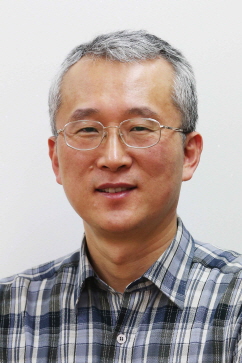 Professor Eunjoon Kim Is KAIST's Person of the Year 2014
KAIST announced that it has named Chair Professor Eunjoon Kim of the Department of Biological Sciences as its “Person of the Year 2014.” The award ceremony took place at the auditorium on campus on January 5, 2014.
Established in 2001, the award has been presented to a KAIST faculty member who has made great achievements in research and education, thereby contributing to the advancement of KAIST.
Professor Kim was the first to identify the mechanism of synapse formation between neurons during his post-doctoral program at Harvard Medical School in 1995. The research was published in Nature.
In 2011, Professor Kim discovered that the lack of protein GIT1, a neuronal synapse in the brain, caused ADHD (Attention Deficit Hyperactivity Disorder). He is widely recognized for his work concerning synapse proteins and brain disease related research that set the foundation for future medical developments.
In his award speech, Professor Kim said, “Whenever a research finding concerning a new drug therapy or research is published, I receive many inquiries from the parents of children with ADHD or autism. As a scientist, I would like to focus my research ultimately to help those in pain, rather than just pursuing research excellence or reputation.”
2015.01.06 View 11844
Professor Eunjoon Kim Is KAIST's Person of the Year 2014
KAIST announced that it has named Chair Professor Eunjoon Kim of the Department of Biological Sciences as its “Person of the Year 2014.” The award ceremony took place at the auditorium on campus on January 5, 2014.
Established in 2001, the award has been presented to a KAIST faculty member who has made great achievements in research and education, thereby contributing to the advancement of KAIST.
Professor Kim was the first to identify the mechanism of synapse formation between neurons during his post-doctoral program at Harvard Medical School in 1995. The research was published in Nature.
In 2011, Professor Kim discovered that the lack of protein GIT1, a neuronal synapse in the brain, caused ADHD (Attention Deficit Hyperactivity Disorder). He is widely recognized for his work concerning synapse proteins and brain disease related research that set the foundation for future medical developments.
In his award speech, Professor Kim said, “Whenever a research finding concerning a new drug therapy or research is published, I receive many inquiries from the parents of children with ADHD or autism. As a scientist, I would like to focus my research ultimately to help those in pain, rather than just pursuing research excellence or reputation.”
2015.01.06 View 11844 -
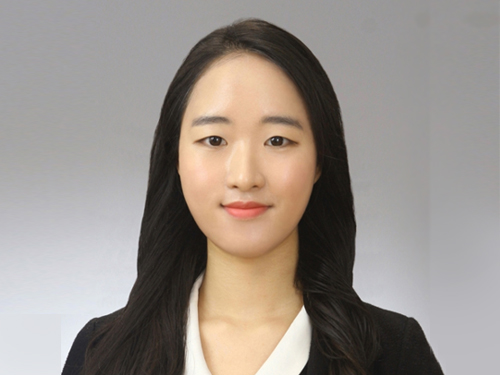 Seo-Eun Lee, an undergaruate student receives the Best Paper Award from Optical Society of Korea
Seo-Eun Lee, a student studying at KAIST’s Department of Biological Sciences, has won the Best Paper Award from Bio-Photonics Division at the 2014 Optical Society of Korea Winter Conference, held on 19th February at Daejeon Convention Center.
Only one outstanding paper per division is given an award among the total of 270 papers, and it is very unusual for an undergraduate student to win the award in the field that is not her major.
Lee has studied cell imaging using holography technology since June 2013 under the supervision of Professor Yong-Geun Park from the Department of Physics.
The Optical Society of Korea was founded in 1989, and as the largest academy in the field of optics in Korea, it holds academic presentations, seminars and lectures every year.
2014.03.06 View 11810
Seo-Eun Lee, an undergaruate student receives the Best Paper Award from Optical Society of Korea
Seo-Eun Lee, a student studying at KAIST’s Department of Biological Sciences, has won the Best Paper Award from Bio-Photonics Division at the 2014 Optical Society of Korea Winter Conference, held on 19th February at Daejeon Convention Center.
Only one outstanding paper per division is given an award among the total of 270 papers, and it is very unusual for an undergraduate student to win the award in the field that is not her major.
Lee has studied cell imaging using holography technology since June 2013 under the supervision of Professor Yong-Geun Park from the Department of Physics.
The Optical Society of Korea was founded in 1989, and as the largest academy in the field of optics in Korea, it holds academic presentations, seminars and lectures every year.
2014.03.06 View 11810 -
 Professor Kim Eun Joon receives In Chon Award
Professor Kim Eun Joon (Department of Biological Sciences) received the In Chon Awarded hosted by In Chon Memorial and Dong Ah Newspaper.
The Award Ceremony will be held on the 8th of October in Seoul Lotte Hotel and Professor Kim will be given a medal and prize money amounting 100million Korean Won.
Professor Kim is a world renowned research in the field of Synapses. Professor Kim graduated from the Department of Pharmacy in Pusan University, B.A. at KAIST, and Ph.D at Michigan University. He has been a Professor at KAIST since 2000.
2012.09.11 View 9524
Professor Kim Eun Joon receives In Chon Award
Professor Kim Eun Joon (Department of Biological Sciences) received the In Chon Awarded hosted by In Chon Memorial and Dong Ah Newspaper.
The Award Ceremony will be held on the 8th of October in Seoul Lotte Hotel and Professor Kim will be given a medal and prize money amounting 100million Korean Won.
Professor Kim is a world renowned research in the field of Synapses. Professor Kim graduated from the Department of Pharmacy in Pusan University, B.A. at KAIST, and Ph.D at Michigan University. He has been a Professor at KAIST since 2000.
2012.09.11 View 9524